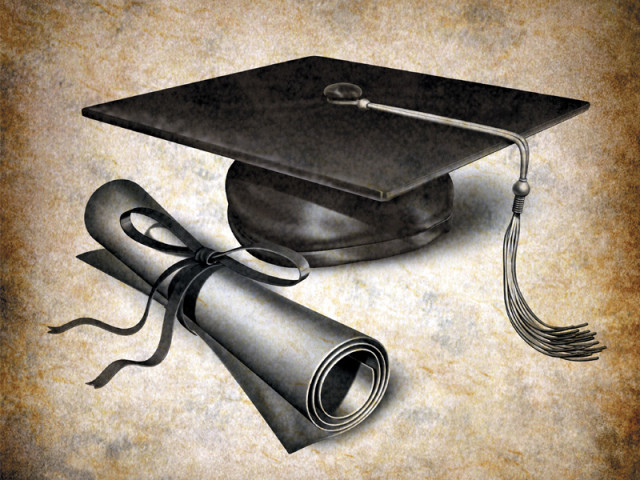Educating mothers: Age is nothing but a number
Education is simply the soul of a society as it passes from one generation to another. — GK Chesterson.

Though the word exercises that she is grappling with are those that a student of class three generally tackles, Mukhtiar is a 40-year-old woman studying at the Cowasjee Campus under the auspices of The Citizens Foundation. This specific class focuses on functional adult literacy and is geared towards women, especially the mothers and elder sisters of children who attend the morning classes at the campus. Known as the ‘Aagahi’ programme, its purpose is to promote ‘Taleem-e-Balighaan’ (adult education) and it offers a chance for mothers like Mukhtiar to learn basic skills that would help them in running their household and improve their lives. After three months of classes, students are expected to be able to read a newspaper, write a letter and do basic math. The kind that comes in handy while buying groceries.
The class is a lively one; a chorus of “pay tay pat, tay alif ta — patta!” resonates in the room. Pencils in hand, eyebrows furrowed in concentration, the women look like typical students trying to finish an assignment on time. Mukhtiar, whose mother tongue is Seraiki, is learning how to read and write in Urdu and says that while she does not have much time to study at home, in class she can focus completely. “My husband has no problems with me studying, as long as I get all my housework done,” she says candidly. Mukhtiar’s six-year-old son Rashid is so enthusiastic about her studies that he constantly tries to teach her at home and does not let any of her other children teach her.
Noor Jehan, another woman in the class, smilingly confides, “I haven’t told my husband about this yet because he will laugh at me. But I will tell him soon because I share everything with him.” When asked if she would like to enrol in another course, she says “If the classes are free, then I’ll keep coming for sure.” Like Mukhtiar’s children, Noor Jehan’s daughter Kiran is also proud that her mother is trying to educate herself and constantly tries to help her with her studies.
The women themselves are enthusiastic about their studies, anticipating the changes in their lives when they learn to read and write fluently. Many here were not just encouraged by their families to take this class — they were actually pressurised by their children to attend.
Asha, another woman in the class, remarks: “My kids wanted me to learn to write. My daughter, Filza, is in class four in this school and she wants to be a teacher which is why she’s always teaching me.” Asha explains that she was always embarrassed that she wasn’t literate, “Coming to this class is more productive than sitting at home, because otherwise I’d just be sleeping or doing gup shup.” Since Kachhi is the main language spoken at home, Asha has to put in quite a bit of effort to learn Urdu but she is determined and, more importantly, interested. When asked about how supportive her husband is, she says, “He has done his matriculation so he encourages me to attend and as long as there is garam khana ready for him when he comes home, he has no problems.”
Amna Khalid, executive adviser of Grants and Alliances at the TCF explains that the programme has been running for the past five years now and the pass out rate is excellent. With setups across the country, TCF plans to target 4,000 women this year. Along with basic reading and writing, women are also taught parenting skills to enable them to become better mothers. Presently the syllabus covers four textbooks but since a lot of the younger women are keen to learn basic English, TCF is planning to incorporate it in the curriculum. Right now the focus is to keep the attendance high because if students attend the classes regularly, they generally manage to do well in their exams.
Meanwhile the classes continue, with children keeping a close eye on their parents’ progress. Kashif, a student of class five, hangs around his mother as she goes over the Urdu textbook, then playfully taps her on the head for getting an answer wrong. It may take a village to raise a child, but here it seems the children are quite capable of keeping the village in line as well.
Published in The Express Tribune, Sunday Magazine, October 9th, 2011.


















COMMENTS
Comments are moderated and generally will be posted if they are on-topic and not abusive.
For more information, please see our Comments FAQ